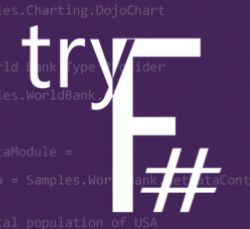| F# 3.0 - Worth A Try |
| Written by Kay Ewbank | |||
| Thursday, 01 November 2012 | |||
|
Microsoft released F# Tools for Visual Studio Express for Web, making F# 3.0 components freely available. Since then Microsoft has updated both the Try F# website and the F# Language Specification. F# provides strongly typed functional programming, and there are F# tools for Mac, Android, HTML5, Cloud, and the Web. Microsoft includes Visual F# in Visual Studio, and the language is also open source under an OSS-approved license and is available across multiple platforms through the F# Open Source Group. F# 3.0, which is part of Visual Studio 2012, has been designed for information rich programming and the latest additions to its resources should help it fulfill its potential, as outlined in this short video:
The major new feature in F# 3.0 is Type Providers which generate types based on structured data thus making it easier to access diverse sources of data. Type providers for the commonly used data sources, including OData (Open Data); database connections such as SQL; database schema; data specified the Entity Data Model format; and Web services in the WSDL format are included in the F# library and there are also walkthroughs of how to use each of them. You can author your own type providers and for help on how to do this see the tutorial Creating a Type Provider (F#) which is also in the library. A new report from Microsoft Research authored by Don Syme and the F# team. describes the design and implementation of the type provider mechanism in F# 3.0 and its applications to typed programming with web ontologies, web-services, systems management information, database mappings, data markets, content management systems, economic data and hosted scripting. Query Expressions is a new feature in F# 3.0 which implements LINQ for F# and allows you to write queries in a SQL-like syntax in the F# language. New library features support query expressions and its QueryBuilder type defines the query computation expression. The updated F# language specification covers the extensions to computation expressions to enable query expressions are this almost hour long video provides an overview of computation expressions in F# and the new features added in F# 3.0.
F# 3.0 also introduced auto-implemented properties which lets you now declare properties without also declaring a backing store for the property. This is another feature covered in the updated F# language specification. F# 3.0 also sees enhancements in the editor and IDE:
There is also a new code editor that is part of the Try F# website, which like the language itself was originally developed by Microsoft Research.
Features of the new editor include:
This this video gives a guided tour to the website:
or you can simply sign in, with your Windows or Facebook log on, and try it for yourself.
More InformationF#3.0 - Strongly-Typed Language Support for Internet-Scale Information Sources Related Articles
Comments
or email your comment to: comments@i-programmer.info To be informed about new articles on I Programmer, install the I Programmer Toolbar, subscribe to the RSS feed, follow us on, Twitter, Facebook, Google+ or Linkedin, or sign up for our weekly newsletter.
|
|||
| Last Updated ( Thursday, 01 November 2012 ) |


